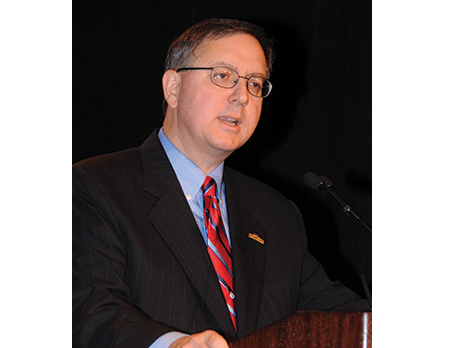A Small-Cable ‘Tea Party’ in Boston?
The smarter way to stay on top of the multichannel video marketplace. Sign up below.
You are now subscribed
Your newsletter sign-up was successful

With all the government issues facing smaller operators these days, the masses assembling in Boston this week for the Independent Show could very well have their own version of a Boston Tea Party.
Members of the National Cable Television Cooperative and the American Cable Association have gathered to hash out thorny issues facing small, midsized and independent cable operators: retransmission consent deals that have left many in the dark, programming costs that are forcing some out of the video business, and the promise — or threat — of over-the-top TV options. There’s also the distant but persistent threat of cybersecurity. Multichannel News editorial director Mark Robichaux caught up with ACA president and CEO Matt Polka to hear about what’s on his mind, and his members’ (polite) policy demands.
MCN:Just this week you sent out a letter criticizing Media General’s TV signal black out of Mediacom cable customers — 14 markets, three Fox stations. The National Association of Broadcasters says retransmission consent is not broken. You and your members disagree. What will it take to fix it?
Matt Polka: Our good friends in the broadcasting business have their feet firmly planted in the regulations of the ’60s, ’70s, ’80s and ’90s, because it does one thing and one thing only, and that’s benefit them and no one else.
The world is moving on. I mean they’ve become dinosaurs holding onto and using these old rules in harmful, anti-consumer ways.
But the fact of the matter is this, ACA for years has been an effective advocate on the need for retransmission consent reform, which everybody but the broadcasters thinks needs to occur. Look at the facts: Since just 2013 there have been nearly 250 blackouts.
MCN:Who fixes this? Congress? The FCC?
The smarter way to stay on top of the multichannel video marketplace. Sign up below.
MP: All of the above. The FCC can certainly make some changes, which they are starting to do and they have done over the last couple of years with their good-faith rules prohibiting coordinated negotiations. Congress has wide latitude in its own oversight to change the rules. I mean, they created the rules back in 1992 for a specific reason that does not exist today and hasn’t for some time.
MCN:When do you think Congress will act?
MP: At the beginning of the year, we all were expecting a larger rewrite in both the House and the Senate, and the net neutrality issues that came out of the FCC have had a significant impact on the communications agenda on the Hill. So both the Senate and House committees are looking at more limited, rifle-shot kinds of approaches. We expect to see some more from the committees here after the August recess.
The hope and the intent is to get started this year; start a process that continues into 2016 and into 2017 after the election is over.
MCN:Related to that are increased programming costs …
MP: We have demonstrated this year the harm of the bundle and how that also hurts consumers through price increases, but also limits our members’ ability to deploy more broadband in their communities. It’s a capital question and an operational question. If you’re spending more money on programming, that’s less that you have laying around to basically deploy broadband. So there is a definite effect.
MCN:You say programming costs prohibit smaller players from deploying more broadband — what happened after you filed that petition to the FCC?
MP: It’s still pending; the FCC has to put its report together and report to Congress. But we have shown very clearly there is definitely linkage between higher programming rates and diminished ability to provide the broadband that consumers want.
We have members that are saying to companies like Viacom and others, and I think we’ll see more of it as time goes on, “Your bundle is just not worth it by way of ratings, by way of what you’re asking, by way of your onerous carriage requirements. We are just not going to renew.”
MCN:Are ACA members prepared to compete with new OTT rivals?
MP: Yes. And, at the same time, they are also coming to Boston to really expand their knowledge base as well as to make sure they understand their options.
The first step is they recognize now that we are now broadband providers who also provide telephone and video. We are in a huge transition era right now where consumers as well as providers are sort of weaning themselves from the old linear traditional cable model to the expansive online, broadbandvideo model, where consumers no longer view video on cable by the channel but increasingly view video online by the program. So it is a really dynamic time, and we’re really on the cusp of the new world.
